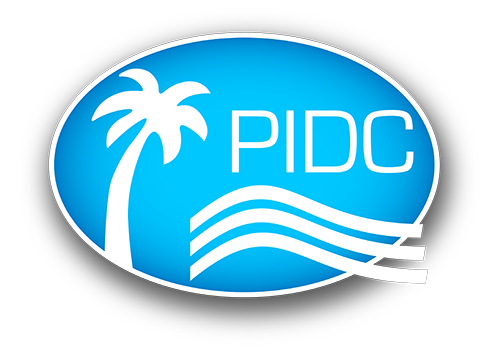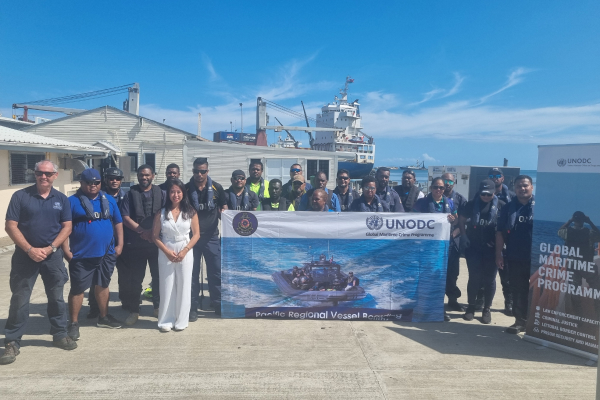Suva, Fiji, April 11, 2024: A two-week training started in Fiji this week for 21 Customs, Immigration and Fisheries Officers from nine Pacific Island Countries who will improve their skills in underway vessel boarding and search methods and enhance efforts in combatting Transnational Organized Crimes and Illegal, Unreported and Unregulated fishing.
The training is being held at the newly opened and the first Pacific Vessel Boarding and Search Training Facility at the Fijian Naval Base in Togalevu, Fiji, constructed through the support of JICA and the Global Maritime Crime Programme (GMCP) of the United Nations Office on Drugs and Crime (UNODC) and in partnership with the Fiji Maritime Surveillance and Rescue Coordination Centre (FMSRCC).
“One of the most important skills in the conduct of maritime law enforcement is the ability to board and search a suspect vessel out at sea,” says Ms. Siri Bjune, Head of the Global Maritime Crime Programme (GMCP). “The unique feature of the curriculum delivered by UNODC is that the training is conducted as underway boarding, which means that the training is done out at sea in different environments such as day boarding and night boarding, compliant and non-compliant boarding. The centre is equipped with the necessary training equipment and safety gear to support underway training exercises.
“Our aim is to build a regional training facility and bring boarding teams from all Pacific Island Countries to train here. The fully equipped training facility will provide the first regional capability to deliver underway vessel boarding and search training for Pacific Island Countries.”
The training is the first part of the partnership signed last year by the Oceania Customs Organisation (OCO), Pacific Immigration Development Community (PIDC), Pacific Islands Chiefs of Police (PICP), and the Pacific Islands Forum Fisheries Agency (FFA) on regional security.
“This initiative is the first in the Pacific to support the 2050 Strategy for the Blue Pacific Continent to strengthen regional security. It represents a tangible step to building a safer, more secure maritime environment,” Fiji’s Minister for Home Affairs and Immigration, Mr. Pio Tikoduadua said at the opening of the facility. “Our food and economic security are closely linked to our maritime security, and the Blue Pacific acts as a vital connector between countries, people, markets, and communities, providing hope for all.”
He added: “Ensuring safety and security is of the utmost importance in the Blue Pacific. Fiji and the region’s security environment is the most unpredictable we have ever seen. Traditional security threats and criminal activities, including human trafficking, drug smuggling, crime syndicates, illegal, Unregulated, and Unreported (IUU) fishing, and cybercrime, continue to pose greater challenges to the region. These activities are anticipated to increase over the years due to advancements in technology and the porous nature of our shared maritime borders.”
The training spearheaded by OCO and UNODC ensures officers understand proper procedures, legal considerations and safety protocols reducing the risk of accident’s injuries or violations of individuals rights during such operations. It also would help OCO, PIDC & FFA maintain maritime security and enforce laws effectively in Coastal (national) and International Waters.
Ms. Nancy Oraka, Head of Secretariat at OCO commented: “The establishment of the first Pacific Vessel Boarding and Search Training Facility marks a significant milestone in our collective efforts to combat transnational crimes and IUU in the Pacific region. When we (OCO, PIDC, FFA & PICP) work together, we will achieve more.
PIDC Head of Secretariat, Mr. Akuila Ratu said: “The Pacific Vessel Board and Search Training course involving Customs, Fisheries, and Immigration officials from across the Pacific is the first ever joint regional training course involving these three law enforcement agencies. This is a significant achievement under the partnership agreement involving FFA, OCO, PICP and PIDC. The course while upskilling our officers more importantly provides an opportunity for participants to collaboratively work together with partner agencies to better understand and appreciate our respective roles and responsibilities and the impact of our collective efforts in combatting maritime transnational crimes and IUU in the Pacific. More so as our strength in the Pacific lays in our collective efforts of working together nationally and regionally to address the challenges of limited resources in monitoring the vast Pacific Ocean with the scattered characteristics of our island nations.”
FFA Director General, Dr Manu Tupo-Roosen said: “FFA is pleased to partner with OCO, PIDC & PICP for this inaugural collaborative Pacific Vessel Board and Search Training. This is a significant step towards harnessing our respective strengths and resources to jointly combat transnational crime and protect the interests of our Pacific region. FFA Members have developed an Integrated Monitoring, control and Surveillance Framework which includes regional surveillance operations, inspections at sea and in port, the use of Maritime Domain Awareness tools, and technologies. We are delighted to share these fisheries initiatives to support our collective work as well as to learn from and continue to work closely with OCO, PIDC and PICP. As always, our Cooperation is the key to the success of our work.”
The second training course planned for June 2024 will be for Police Maritime Units of Pacific Island Countries.
ENDS.
About OCO: Oceania Customs Organisation is a grouping of 23 Customs Administrations in the Pacific region. It facilitates regional cooperation, information sharing and capacity building of its members with the overall target of supporting economic growth and improved border security in the Pacific.
About FFA: The Pacific Islands Forum Fisheries Agency (FFA) strengthens national capacity and regional solidarity so its 17 members can manage, control and develop their tuna fisheries now and in the future.

